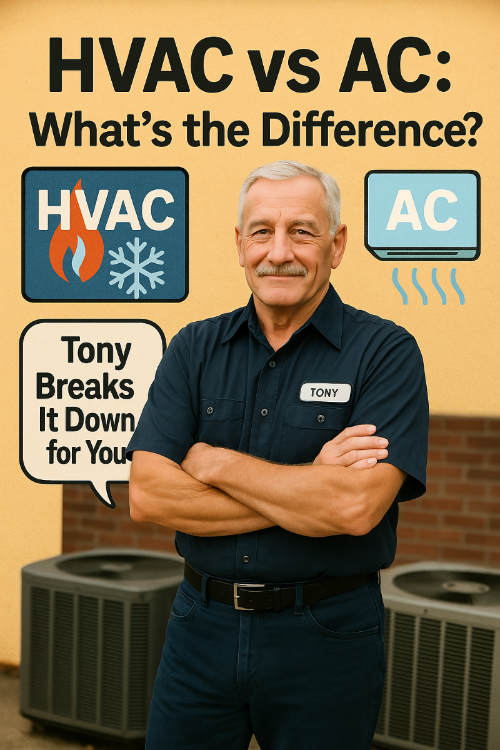❓ Got questions about your home comfort system and keep hearing terms like HVAC and AC tossed around like they mean the same thing? Let Tony the Trusted Tech clear it up for you. Spoiler: they're not exactly the same — and knowing the difference can save you money and headaches.
Let’s Clear the Air: HVAC vs AC
Every summer, I get this question more than you’d believe:
“Hey Tony, is HVAC air conditioning? Or is it something else?”
Short answer? HVAC includes air conditioning, but it’s more than that.
Let’s break it down, neighbor-style. Whether you're shopping for a new system like this 2.5 Ton 14.5 SEER2 R-32 Air Conditioner and Air Handler System or just trying to understand your current setup, knowing the difference between HVAC and AC helps you make smarter choices.
What Is AC? Just the Cooling Part
AC stands for Air Conditioning.
That means cooling only. Your typical air conditioning system is designed to pull heat out of your indoor air and pump it outside. What you’re left with is a cooler, more comfortable home during the hot months.
When folks say "I need AC," they’re usually talking about a setup that includes:
- An outdoor condenser unit (like the GLXS4BA3010 in the system linked above)
- An indoor air handler or coil
- Refrigerant to move heat outside (R-32 in this case, which is better for efficiency and the environment)
If cooling is your only concern, then yes, an AC system like this 2.5 Ton 14.5 SEER2 unit may be all you need.
Not sure how SEER2 ratings work? Check out this breakdown from Energy.gov — it’ll help you understand how modern units are rated for efficiency.
What Is HVAC? The Whole Climate-Control Package
HVAC stands for Heating, Ventilation, and Air Conditioning.
In other words, it covers everything that controls the air in your home:
|
Component |
Purpose |
|
Heating |
Furnace or heat pump |
|
Ventilation |
Ductwork, air filters, fresh air |
|
Air Conditioning |
Cools the indoor air |
So, when you hear someone say “I’m replacing my HVAC system,” they could be talking about:
- The furnace
- The AC unit
- The ducts
- Or all three
And yes — that means AC is just one part of HVAC.
👉 So to answer the popular question: Is HVAC air conditioning?
No — but air conditioning is part of HVAC.
Real Talk: Why the Difference Matters
You might be thinking:
“Okay Tony, but why should I care whether it’s HVAC vs AC?”
Good question. Here’s why it matters:
1. Maintenance Schedules Are Different
Your AC and your furnace run in different seasons and have different wear-and-tear patterns. You need to service them at different times. Don’t wait until it breaks — trust me, July is not the time to find out your AC needs a new capacitor.
2. Energy Efficiency Decisions
Say you’re looking at a high-efficiency AC unit like this 2.5 Ton 14.5 SEER2 R-32 System. You want to make sure the heating side of your system doesn’t undo all the savings you’re getting from your cooling. That’s HVAC thinking, not just AC thinking.
For a deep dive into how to get the most out of your energy savings and appliance choices, check out Consumer Reports’ Air Conditioner Buying Guide.
3. Replacement Costs
Replacing just an AC unit is cheaper than replacing your whole HVAC system. If your furnace is still running fine, you may not need a full HVAC overhaul. But if your ductwork is a mess or your ventilation isn’t up to code, it might be time to think bigger.
Choosing the Right Setup for Your Home
Not sure what’s right for you? Let’s break it down by situation.
✅ If You Only Need Cooling:
Go with an AC-only system like the 2.5 Ton 14.5 SEER2 R-32 System. It’s energy-efficient, uses eco-friendlier R-32 refrigerant, and is a solid mid-size option for homes around 1,300–1,600 sq ft depending on your climate.
Want help figuring out what size AC unit your home needs? Carrier’s HVAC sizing guide is a solid starting point — easy to follow and accurate.
✅ If You Need Heating Too:
Look into a full HVAC package that includes a gas furnace or heat pump along with your AC. Systems like these are more complex but give you total year-round comfort.
If you're unsure what size or setup you need, Energy Star's official HVAC replacement guide can help you plan your system based on your home and climate.
Tony’s Take on R-32: Why It Matters
I know some of you sharp homeowners have been asking:
"What refrigerant does this system use, and does that make a difference?"
Yes, it sure does.
The 2.5 Ton 14.5 SEER2 System uses R-32, which is a low-global-warming-potential (GWP) refrigerant. That means it’s:
- Better for the environment than R-410A
- More energy efficient
- Future-ready, so you don’t get stuck with a phased-out system in a few years
The EPA is actively pushing for refrigerants like R-32 in residential HVAC systems. So, if you’re thinking ahead, you’re already on the right track.
Final Word: Don’t Get Confused by the Lingo
The whole HVAC vs AC thing can trip people up — even pros sometimes.
But now you know:
- AC = Cooling only
- HVAC = Heating + Ventilation + Air Conditioning
- And yes, AC is part of HVAC, but not the whole story
If you’re shopping for a system or upgrading an old one, take a step back and ask yourself:
“Do I need just cooling, or do I want full climate control?”
That answer will point you in the right direction — and save you from spending more than you need.
And if you’re still unsure, give me or the team at The Furnace Outlet a shout. We’ll help you find the system that fits your home and your budget.
Stay cool (or warm),
– Tony the Trusted Tech







